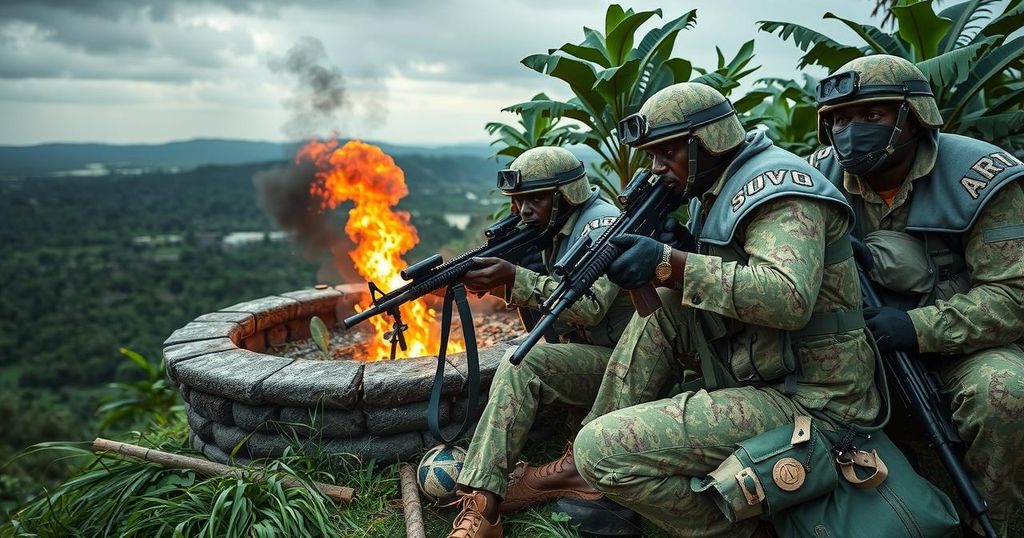Rwanda-Backed M23 Rebels Capture Masisi in Eastern Democratic Republic of Congo

Rwanda-backed M23 rebels have seized the town of Masisi in eastern DRC, marking their second takeover in two days and contributing to a worsening humanitarian crisis. Attempts at mediation between the DRC and Rwanda have stalled, and concerns over military support for the rebels and exploitation of mineral resources persist.
Rebel forces affiliated with Rwanda have successfully taken control of the town of Masisi in the eastern region of the Democratic Republic of Congo (DRC), marking the M23 group’s second territorial acquisition in recent days within the mineral-rich North Kivu province. Since the organization’s resurgence in 2021, it has been responsible for significant land seizures in eastern DRC, resulting in the displacement of hundreds of thousands of civilians from their homes.
Angola had been mediating negotiations between the DRC’s President Félix Tshisekedi and Rwanda’s President Paul Kagame; however, those discussions collapsed last month. “It is with dismay that we learn of the capture of Masisi centre by the M23,” remarked Alexis Bahunga, a member of the North Kivu provincial assembly, expressing concerns that the takeover exacerbates an ongoing humanitarian crisis and urging governmental reinforcement of military capabilities in the region.
Local residents reported that M23 leaders convened a meeting with inhabitants, proclaiming their intent to “liberate the country.” The local population of Masisi, which stands at approximately 40,000 people, is situated around 80 kilometers (50 miles) north of Goma, the province’s capital that the M23 briefly captured in 2012. Following Friday’s conquest of the nearby town of Katale, speculation arose about potential threats to Goma, which houses about two million inhabitants, a concern echoed since last year.
While hostilities had subsided for a period, renewed fighting began in early December. In July, Rwanda did not contest a United Nations report stating the presence of about 4,000 Rwandan military personnel in support of the M23. Rwanda has accused the Congolese government of insufficiently addressing the region’s prolonged unrest and has alleged complicity with figures implicated in the 1994 Rwandan genocide against Tutsis and moderate Hutus.
The M23 emerged as a faction in 2012, initially claiming to defend the Tutsi population in eastern DRC, which has long experienced persecution. However, critics assert that Rwanda exploits the M23 for access to valuable mineral resources like gold, cobalt, and tantalum—crucial components for electronics. Recently, the DRC government initiated legal action against Apple regarding the acquisition of these so-called “blood minerals,” prompting the technology company to declare it has ceased sourcing from the DRC.
The conflict in eastern DRC, particularly in North Kivu province, is deeply intertwined with both local ethnic tensions and broader regional dynamics involving Rwanda. The M23 rebel group, which emerged following a history of civil strife within the DRC, claims to advocate for the Tutsi minority but is widely accused of exploiting the region’s rich mineral resources. Tensions heightened as Angola sought to mediate peace talks between the DRC and Rwanda, highlighting the international attempts to resolve a conflict that has persisted for decades. The humanitarian crisis stemming from the ongoing violence underscores the urgent need for effective governance and international support in addressing the complexities of these overlapping conflicts.
The recent capture of Masisi by Rwanda-backed M23 rebels signals a troubling escalation in the already volatile situation in eastern DRC. With the M23’s growing influence and substantial military backing from Rwanda, the humanitarian implications for the local populace could be severe. The failure of mediation efforts and the allegations surrounding resource exploitation further complicate the path to peace, necessitating urgent responses from both local authorities and international entities to safeguard stability and human rights in the region.
Original Source: www.bbc.com








